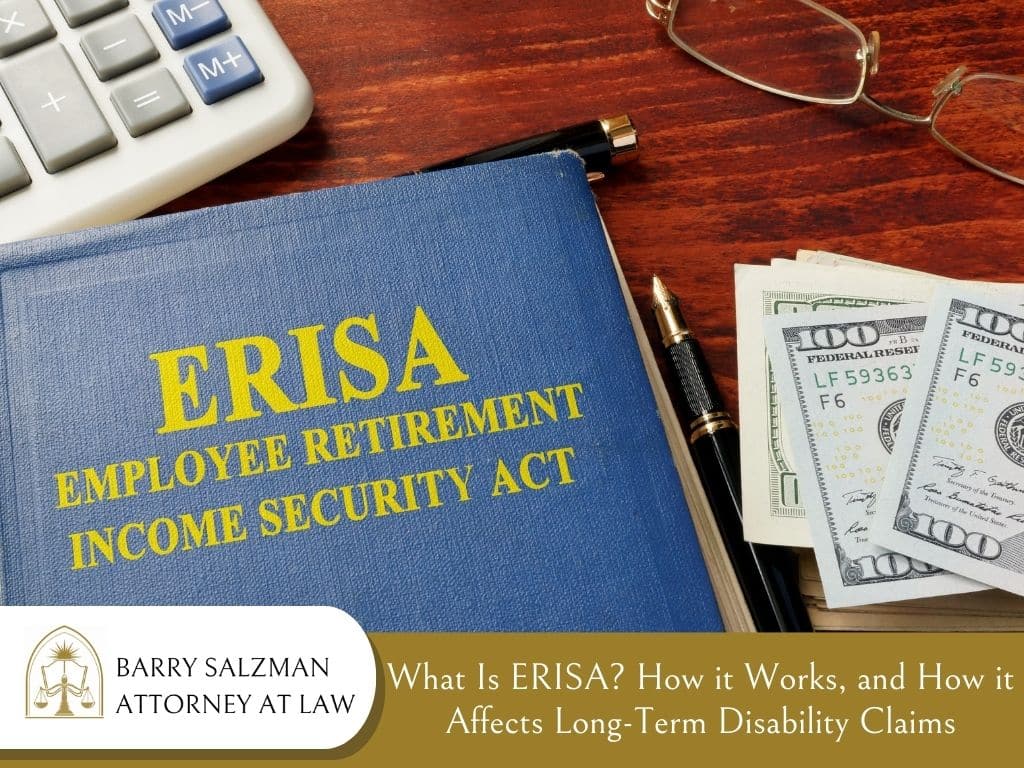What Is ERISA? How it Works, and How it Affects Long-Term Disability Claims

Whether you have an individual policy or an ERISA disability plan, you need competent legal guidance when you start your claim, not when you find yourself going to court. At that point, it’s often too little, too late. An attorney can be essential in gathering the evidence necessary to prove your claim. You will need the cooperation of your doctors in completing disability reports, providing medical records, and explaining why you cannot perform work activities.
In this article, we will discuss about individually purchased disability insurance and employer-sponsored disability plans, how they work, and what to do when your claims are denied.
What we will NOT talk about: Social Security Disability, Supplemental Security Income (SSI), Railroad Retirement Act, Federal Employee Retirement and Disability, State Employees disability benefits, and similar government-provided disability systems.
Individually Purchased Disability Insurance

These are insurance policies that you purchased yourself and for which you pay all the premiums. Typically, these policies are purchased by self-employed persons or others and are not provided by or through your employer. These policies are contracts directly between you and an insurance company.
What Should I Do if My Claim Is Denied?
Denial of benefits by your insurance company allows you to file a lawsuit against the insurer for breach of contract. You may file that lawsuit in state court (in some cases, the insurer may remove the case to federal court). You are entitled to a trial by jury. You need only prove your claim by the greater weight of the evidence (more than 50%).
In most states, the court may award attorney fees if your claim is successful. You may submit additional evidence supporting your claim after the insurer issues a denial of benefits. Your lawsuit must be filed within the period of limitations for breach of contract actions (5 years in Florida).
ERISA and Employer-Sponsored Disability Plans

The group disability coverage is provided by your employer as part of an employee benefit plan. These plans are governed by the federal Employee Retirement Income Security Act (ERISA). ERISA was enacted in 1974 to protect employee welfare benefit programs that may include pensions, health insurance, profit-sharing, and disability benefits by requiring and enforcing adequate funding and accounting to ensure these benefits will be available when needed. That’s the good part. The bad part is that ERISA was also intended to limit litigation over these benefits when denied. Under ERISA, disability claims must be processed within certain time limits.
What to Do if A Claim Is Denied?
If a claim is denied, the plan administrator (or claims administrator) must provide a detailed explanation of why the claim was denied and the evidence supporting the decision. Following the denial of benefits, the claimant has 180 days to file an appeal with the plan administrator and offer additional evidence to support the appeal. The appeal must be processed within certain time limits.
As with the initial denial, the plan administrator must issue a detailed explanation of why the appeal was denied and the evidence supporting the decision. Some plans allow for filing a second appeal with the plan administrator. Once all appeals with the plan administrator have been denied, the claimant may then file a lawsuit to seek judicial review of the final decision of the plan administrator.
A suit may be filed in state court; however, ERISA allows the plan administrator to remove the case from state court to federal court. Most all such suits are removed to federal court to allow for a more uniform interpretation of ERISA law. Unless otherwise provided in the disability plan, your lawsuit must be filed within the period of limitations for breach of contract actions in the state where you live or within the period specified in the plan, which may be shorter than the period provided under state law.
How the ERISA Claim Process Works

The claims administrator will seek medical records from your treating physicians. Some or all of those doctors will be asked to complete Attending Physician Statements on which they are asked to address your ability to perform a work activity. Sometimes the claims examiner will call your doctor to discuss how your condition affects your ability to work.
Be aware that many physicians dislike responding to requests for this information and can be very unhelpful Some may refuse to complete any paperwork related to your claim. You need to have a candid conversation with your doctors about their willingness to assist you with your claim. It is not unreasonable for doctors to ask to be compensated for the time they spend completing paperwork and responding to calls from the claims examiner.
You should also be proactive in providing the claims administrator with additional medical information as your treatment progresses. The claims examiner will also seek information from the employer concerning the requirements of your job. You need to make sure that the employer’s description of your job is accurate. You may wish to get statements from managers and supervisors about the difficulties you have experienced performing assigned work. You may be sent for a medical examination with a doctor selected by the claims administrator (referred to as an independent medical examiner; they are not).
The claims administrator may employ a vocational consultant to address whether your physical or mental limitations would preclude your ability to perform your assigned work. Having legal assistance during this period is critical. Your attorney can follow the progress of your claim and be prepared to provide evidence to overcome adverse opinions from independent medical examiners and vocational consultants. Your attorney may also determine whether your case will benefit from obtaining your own medical and vocational consultant to overcome adverse opinions obtained by the claims administrator.
ERISA’s Statute of Limitations

ERISA imposes very substantial restrictions on litigation in court:
- In most circumstances, the court is limited to consideration of whether the plan administrator’s decision was arbitrary and capricious. This means that you have the burden of proving that there was insufficient evidence or no reasonable basis for the denial of benefits. It also means that the court must defer to the judgment of the plan administrator with respect to the interpretation of the terms of the plan and the consideration of the evidence.
The court must apply the arbitrary and capricious standard so long as the plan specifically allows the plan administrator broad discretion in the interpretation of the plan and the evidence. Virtually all plans do so. This is a much more difficult and higher burden of proof than required if litigating an individually purchased policy, where the burden of proof is simply whether the greater weight of the evidence supports your claim.
More importantly, the court or jury is entitled to make its own assessment of the evidence regardless of the insurer’s reasons for denying the claim. - There is no right to a jury trial in ERISA cases.
- In most cases under ERISA, the claimant may not submit additional evidence not previously submitted to the plan administrator prior to the plan administrator’s final decision. This is a critical point!
Many claimants without the services of an attorney file their appeal with the plan administrator and merely argue about the plan administrator’s reasons for the decision without submitting any additional evidence supporting the claim. When that claimant gets to court, they then want to file additional evidence supporting the claim and find that the court refuses to accept that evidence because it was never submitted to the plan administrator. - Under ERISA, the court may but is not required to award attorney fees to a successful claimant. This means that you will ultimately be responsible for the payment of attorney fees.
- Pay attention to how disability is defined under the plan. Most ERISA plans define disability as the inability to perform the essential requirements of your assigned job. This definition is usually limited to the first two or so years after your disability begins. After that period, the definition reverts to whether you can perform any job which you are physically and mentally able to perform. For example, if you are a skilled machinist and become disabled, you may easily establish that you cannot perform this job because of back pain. After two years, however, the plan administrator may show that you can work in a light, unskilled job; if so, benefits will end.
Remember that both individual policies and ERISA disability plans are simply contracts and are governed by the terms of the coverages provided. ERISA does not prescribe what benefits are to be provided. For example, some plans allow only limited benefits for disability due to mental disorders. Others restrict benefits if the disability is due to self-reported symptoms such as migraine headaches.
In Conclusion

Especially in ERISA cases, your own doctor’s opinion and that of any examining physician you may hire may not be enough to overcome other opinions offered by the claims administrator. What is important is showing why the opinion of the “hired gun” is wrong. The time to get this done is before the claims administrator renders the final decision.
Remember, in ERISA cases, it is not enough to show that there is sufficient evidence to support your claim. Instead, you must show that there was insufficient evidence to support the denial of benefits or that there is no reasonable basis.
Like it or not, ERISA claims are stacked against you. Without competent legal assistance, you will not be able to navigate these difficult waters.
Attorney Barry Salzman Can Help You with Your LTD Claim
Seek legal advice and assistance as early as possible if you wish to file a disability claim. If you find this article very helpful, schedule a consultation with Attorney Barry Salzman today or call (727) 334-7547 for legal assistance and to help you navigate your way through the short-term and long-term disability claim process.
Schedule Your Consultation Today
Navigating the bureaucracy of any disability program is complex and frustrating and often ends in denial.
Don't do it alone! Have a dedicated, experienced advocate on your team.
Fill out the form below or give us a call at 727-321-4993.



